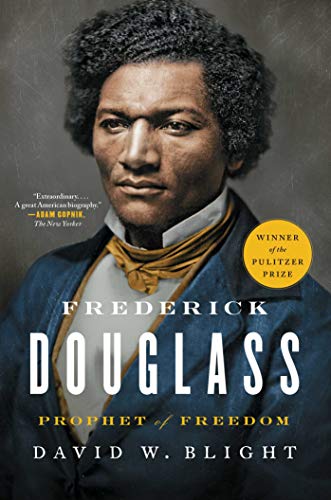Frederick Douglass: Prophet of Freedom Link to heading
Summary Link to heading
“Frederick Douglass: Prophet of Freedom” by David W. Blight is a comprehensive biography that chronicles the life of Frederick Douglass, an iconic abolitionist and former slave. The book delves deeply into Douglass’s journey from his birth into slavery in 1818 to his rise as one of America’s most compelling voices for freedom and equality. Blight explores Douglass’s intellectual development, his involvement in politics, and his role as a powerful orator advocating for the abolition of slavery, women’s rights, and civil reform. The narrative also sheds light on Douglass’s personal life, including his relationships and the complexities of his family dynamics. Central themes of the biography include the struggle for racial justice, the power of rhetoric in social change, and the enduring quest for personal freedom and dignity.
Review Link to heading
David W. Blight’s “Frederick Douglass: Prophet of Freedom” has been widely acclaimed for its depth of research and insightful analysis. Blight combines extensive historical detail with thoughtful interpretation, painting a vivid portrait of Douglass’s multifaceted personality and influential role in American history. The biography received positive attention for its rich narrative style and its ability to contextualize Douglass within the wider scope of American social and political evolution. One of the book’s notable strengths is Blight’s ability to portray Douglass not only as a historical figure but as a symbol of the timeless struggle for freedom and equality. Critics have praised Blight for his meticulous approach and the book’s ability to engage both scholars and general readers. Some critiques note the book’s considerable length and detail, which may be dense for casual readers.
Key Takeaways Link to heading
- Freedom and Equality: Douglass’s life exemplifies the ongoing fight for civil rights and the importance of perseverance in the pursuit of justice.
- Power of Oratory: Douglass’s speeches demonstrate the influence of rhetoric in social movements and change.
- Resilience and Self-education: His rise from slavery to prominence underscores the power of education and resilience in overcoming obstacles.
- Complex Personal Life: Douglass’s personal relationships and family life were intricate and reflective of larger social issues such as race and gender roles.
- Historical Context: The book situates Douglass within the broader historical and cultural shifts of the 19th century, providing valuable context for understanding contemporary issues.
Recommendation Link to heading
“Frederick Douglass: Prophet of Freedom” is recommended for readers interested in American history, civil rights, and biographies of influential figures. It is particularly insightful for students, educators, and scholars seeking a nuanced understanding of Douglass’s impact on American society and the enduring relevance of his fight for justice. Readers who appreciate detailed historical narratives and character studies will find this biography both enlightening and engaging.
